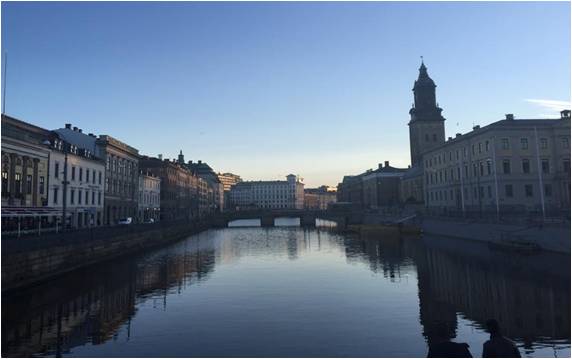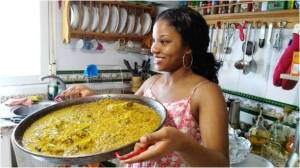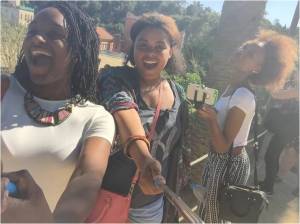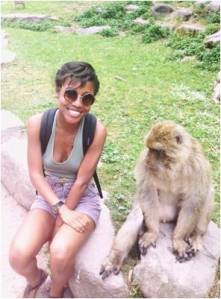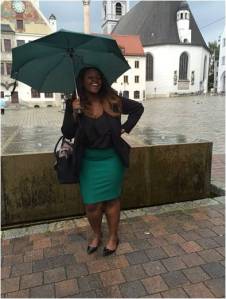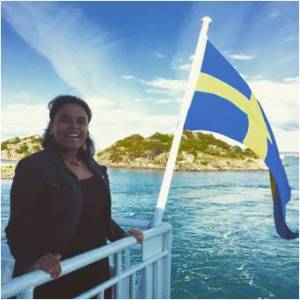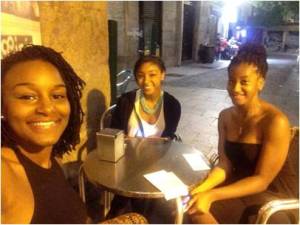Scholar Highlights for Week Ending June 12, 2015
Asia Payne
This week has been an exhausting but rewarding week. Last week, I was just trying to adjust to the work schedule and different eating times. Meanwhile, I also was trying to get used to coming to a lab everyday. However, now I am starting to ask questions more in the lab, and I have been documenting all of my data on my computer in an organized way. The purpose of my research project is to ultimately be able to crystallize purified proteins so that we are able to see the structure of these proteins.
Martine Williams
The scientific process here in relation to back home is more difficult because I have it so much easier back at school. Most of the stock solutions or experiments are already set up for me and ready to use. But here, I am doing everything by myself. Again, I found this as another time where I take for granted the comfort I have back home. However, as a scientist, this entire process is teaching me that it will not always be easy and I wont always have a teacher there waiting for me when I need help. There will be times when I must do it myself. GSTEM is forcing me to look beyond America and apply my scientific knowledge in a foreign country while still managing to do everyday things
Jett Bagley
The greatest difference I noted had to do with language. Because in Chinese many words are very similar, during concerts, movies and television, everything has subtitles. This requires much more engagement with the performance /program than is needed in the west and makes me wonder what effect this has people’s attention span and if the average attention span in Chinese speaking countries is longer.
Deleonne Clark
As the week progresses I get closer and closer to working with my research data. For right now, my mentor wants me to focus on programming differential equation problems. Professor Sarsa does not hover over me and pressure me to get my work done. In a way, his relaxed attitude makes me want to work harder so that I can prove to him what I am capable of. I love the atmosphere I am working in. Professor Sarsa is very easy going, easy to talk to, and approachable. I do not dread going to the University every day because I know will not be in a tense environment. I also work by myself, and I thought that would be difficult because I work best in groups. I have learned to utilize my resources. Although my mentor does not communicate with me in Spanish, his colleagues do. I have gained confidence in my problem solving abilities. I had a habit of giving up or looking for an easier way out when a problem grew too difficult. But I take pride in the problems he gives me, and I take even bigger pride when I can find the solutions.
Sanura Dewa
I am very dedicated to learn Spanish while I am out here because I have been told that my accent is very good and if I knew the actual vocabulary then I would be able somewhat blend in. Another thing that I noticed while being out here is that there are Africans all throughout Madrid but they all speak Spanish. I am getting better at understanding my coworkers now and I found out that there is a guy my age who also works there and he speaks English! I was so happy and he kind of took me by surprise because every time I saw him he was speaking Spanish. I now have another person that I can talk to in English and someone I can look to if I need a quick translation when I am struggling with my Spanish. Each day keeps getting better and I am truly loving my time here in Spain.
Jasmin Eatman
London is absolutely positively amazing! Honestly, at first, I didn’t even want to travel abroad in the UK. I would have much rather traveled to the continent of Africa or maybe South America, but London certainly wasn’t on my radar. Now, I am absolutely loving the community, people, and definitely all the fresh food options. My research mentors are great, and because of a mix up I have two research mentors now instead of one. They seem really open and willing to answer questions, provide support, and help me to do what it is that I really want to do.
Akeela Lewis
The two other Spelman students I live with decided to have a taco night. We bought what we thought was ground beef but it turned out to be mystery meat. Some parts of the meat were hard after we cooked it and the other parts had the same texture as lamb. The produce here in Spain is different from the United States. The fish taste more fresh and fishier. The chicken is white instead of pink. They also sell whole rabbit in the supermarket. I went with a few Spelman students to a calm burger place. They played music that would normally not be played in a restaurant. The music consisted of current songs that you would here at the club in the United States. It did not match the atmosphere. Just like in the Dominican Republic waiters take a while to give you the check. The shortest wait we’ve had is 20 minutes, the longest is a hour. The person serving always assumes that we want a coke. This happened to me a lot in the Dominican Republic also.
KayCei Moton-Melancon
In reference to lab, my project is going very well. I am completely being immersed in the field of food science and it’s new and exciting. This week we preformed various skills labs necessary to begin our designated project. We preformed elemental composition, which allowed the fish characteristics such as: water retention capacity, humidity, and ash production to be revealed. We became familiar with the Kramer Test and its importance to texture. We learned the correct guidelines for cutting and handling all fish. We also received an opportunity to learn about the Spanish culture related to fish and other traditional foods. Finally, we learned how the record the respiration rate of the Anisakis and the respiration rate’s importance to the viability of the Merluccius merluccius. In all, I would say that I really enjoyed this week’s lab experience and I look forward to the next steps in my project.
Courtney Lett
The other day I listened to a research presentation on l’apprentissage artificiel, or machine learning in English. The talk was completely in French but I surprised myself with how much information I retained. Of course there were parts of his presentation I probably missed but my French is gradually getting better with each day. I try to listen to the conversations of people on the street or my labmates to see what I can pick up. One of the secretaries from the building told me that if I can learn to understand the “very French” accents here I’ll be able to understand all over France! Hopefully by the end of the summer I can call myself nearly fluent.
Krista Montgomery
I have been in Madrid, Spain for almost one week and I have experienced a mixed of emotions already. Since I have arrived I have learned so much culturally, academically and emotionally. One of my major struggles has been the language barrier. I have been studying Spanish before my departure but understanding the language has been harder than expected. I am starting to realize how essential language is in communication and how it is a necessity to survive in the world. Being inside and outside of the lab has helped me to diverge myself in Spanish culture. Some of the small cultural shocks that I have experienced are the later lunches and dinners that the Spanish people partake in. Another shock is the thirty to an hour coffee break that occurs after lunch. I also learned that you never eat lunch alone. Everyone goes with each other. Although I have only been in Spain for a week I have gained some exposure to some scientific methods in the lab.
Nacarri Murphy
In Spain, there are a variety of cultural differences that acted as a catalyst when I am trying to communicate with others. Of course the more obvious barriers exist, for example language, food, and physical features. However there are a few barriers that I have discovered impact my relationships with others in a different way. These barriers mostly come from hidden cultural normality’s that I am either unaware of, don’t understand, or both. While I have been in Spain thus far, I have experience cultural norms that have impacted my relationships with others both small and big. Some norms are as small as knowing the appropriate time to eat lunch. While some are as big as people in your neighborhood viewing you as rude because you are unaware that it is disrespectful to walk through a group of 2 or more people. Fortunately, I quickly learned to eat a big breakfast since in Spain the appropriate time to eat lunch is at 2 pm. And by analyzing the facial expressions of others as they almost walked in between myself and another person, I was able to ask my Spanish host family what the significance of this event was. Since I am a very observant person, I feel as though I am doing pretty good in attempting to follow the different dynamics of the social norms in Córdoba.
Jessica Sainyo
It’s hard but I think that anything is what you make it and I refuse to let not speaking Spanish or understanding anything anyone is saying mirror my experience in Spain or any other country I visit. Now I have grown more accustom to it so it is not as “scary” as when I first arrived to Granada, Spain.
Overall my stay at Madrid was beautiful and I would not trade it for anything. I had an awesome time there and I am actually learning more about myself. Though I still find myself stressing about some of the things back in the U.S. I make sure that it does not overpower my experience here in Europe. I will continue to I guess you can say “Find Myself” and get to know new people and new things. I am also enjoying my lab and will actually take more about it in my next portfolio.
Jaycee Holmes
From Monday to Thursday, I participated in the Conference for Computer Supported Collaborated Learning (CSCL) in Gothenburg Sweden. While in Sweden, I worked on a couple of approaches to my optimization problem at Inria. I am using straight lines to approximate the overtaking procedure, as I am more familiar with trigonometry than I am with curve theory. Once I have understood from this angle, I will continue to understand how to optimize the energy within a Bezier curve. I will be reviewing my results from this process with Dr. Milanes, come Monday.
Sky Myers
Last but not least: fish! I find my lab very interesting. I have never conducted research on food, nutrition, and metabolism, but this has genuinely sparked a new interest in me. My project is focusing on optimizing the quality of the fish (cod, hake, salmon, etc) while destroying a harmful parasite worm, Anasakis. This week I have learned how to prepare fish fillets, conduct the tests to determine the elementary compositions of humidity, ash, water retention rates, and the pH. I learned how to conduct the Kramer test, which is a machine that acts like a jaw and measures the force tha it takes to break the surface. I’ve also learned how to use a respirator that I will use to measure the oxygen uptake of the Anasakis, and apply to my project. Working with food and nutrition inspires me to become a better cook, monitor what I put in my body, and even offer advice to others and my mother who loves seafood as much as I do. There are other aspects of my project I can further apply to my life, for example allergens and intolerances. Some of my family members have allergies to shellfish and fish and I am curious to see how I can relate my experiments to an aspect of their daily life. This is all very exciting to me!
Tayhlor Tanner
In the lab this week we ran PCRs and agarose gel electrophoresis on the same DNA that we extracted from the leaves of Arabidopsis plants last week using different primers. This week was a sort of practice for the procedures that we’re going to run on the samples that will be used in our research. On Thursday and Friday, we extracted DNA from the plants that we will be working with for the remainder of the project. Everyone in the lab is helpful. If at any time I have a question, I can ask someone in the lab and he/she will help me.
